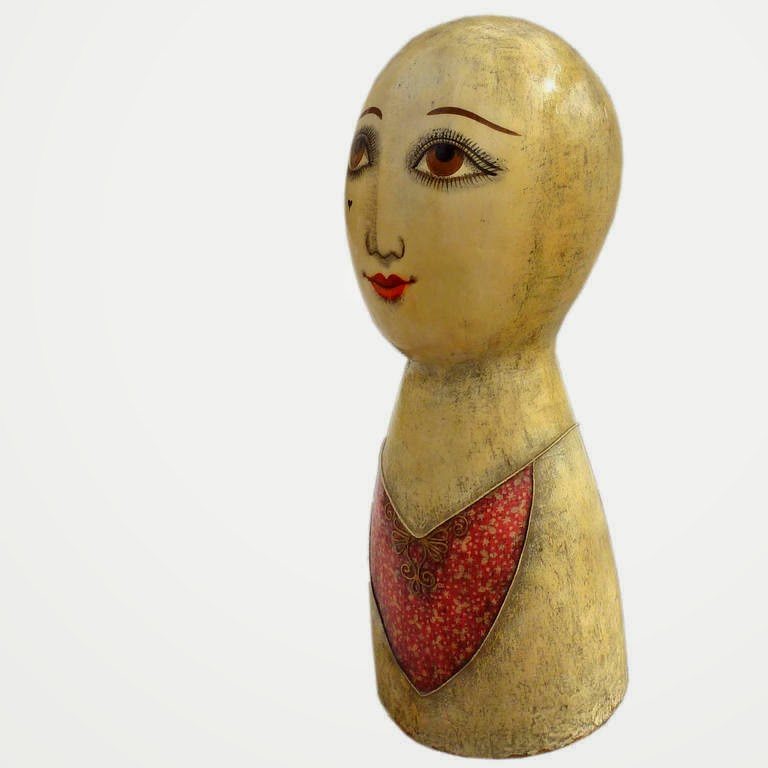In 1937, 14-year-old Gemma left home in Westchester, New York, and moved to Greenwich Village. To make a living, she painted store window signs, and whenever she had any extra money, she would take art courses at the Cooper Union School of Arts and Sciences in New York City.
When she was 18, she walked into the office of Mr. John, the famed hat maker, and showed him her work, hoping to get a job and collaborate with him. He was immediately taken with her talent, and he had her make papier mache busts on which he displayed his hats. He also opened a boutique to sell a variety of her pieces, including the open-top dolls and lipstick cases. By the time Gemma was 20, she was teaching art and selling her own paintings, and by the early 1950s, her work had been discovered and was being sold in stores such as Saks Fifth Avenue, Nina Ricci, and Schiaparelli.
When in the hospital for an appendix removal, she met Dr. Juan Del Rio. They fell in love, married, and moved to Mexico City in 1954, where Gemma started a papier mache boutique called Artes Gemma, in partnership with California artist Fred Sexton. They created lions, ponies, cats, lipstick cases and compacts, as well as beautiful colorful bracelets. She also began to paint portraits.
In the 1960s Gemma, quite accidentally, discovered a method that made her papier mache have the appearance of porcelain. She explained the fortunate accident:
One of the things I was most successful at was to come up with a coated finish to the dolls that looked and felt like porcelain, a semi-gloss enamel that gave the figures a really attractive look. The finish came to me quite by accident. One night I worked till very late, and I put too much glue on the piece. But in the morning when I saw the beautiful satin patina on the piece, I thought, "How did that happen?" When Elmer's glue dries, it dries clear, and with a matte satin finish. It was so beautiful.
I then experimented and put gypsum down first. You can sand the gypsum 'til its smooth as a baby's ass. Then paint with Elmer's glue slightly diluted. The features were done with watercolor over the glue. Then you lacquer with clear lacquer. And it's wonderful.
Soon she found herself at the head of a factory producing papier mache objects. She continued to work, but she also had over 60 employees working with her. It was around this time that Peggy Guggenheim discovered her work, and soon it was pictured on magazine covers around the world.
Eventually, companies began to copy her work and compete with her, so in 1966 she left Mexico and moved to Palos Verdes, California, where she made tiles and jewelry and taught art for the rest of her life. Although she missed Mexico, she knew that she had left behind a papier mache industry that continues to provide work for the people there.
Taccogna's work has been displayed at the Tate Gallery, the Museo de Bellas Artes, and the Antonio Souza Gallery.
Her granddaughter Evie Elman has done a fascicnating documentary about Taccogna's life, which I highly recommend your watching if you'd like to know more about this remarkable woman.
From cargocollective.com and papiermache.co.uk
 |
| A Taccogna portrait cargocollective.com |
 |
| Tiles designed by Taccogna cargocollective.com |








How lovely....I hadn't heard of this person before, those doll's heads are simply beautiful.
ReplyDeleteIt's hard to believe she got that porcelain look with Elmer's glue!
DeleteI was wondering if the piece I have is one of her works. How can I send you a picture?
ReplyDeleteShe went to Evander Childs HS in the Bronx (class of ‘40) and was a cartoonist.
ReplyDeleteI do estate sales and have 3 large canvas paintings, abstract fruit. MCM I would love to share pictures with you and am actually looking for a buyer. Are you able to share your email.
ReplyDeleteThank you for your consideration,
Colleen Fitch
I have a Gemma del Rio painting as welI that I would like to sell..
DeleteAre they still available?
Delete